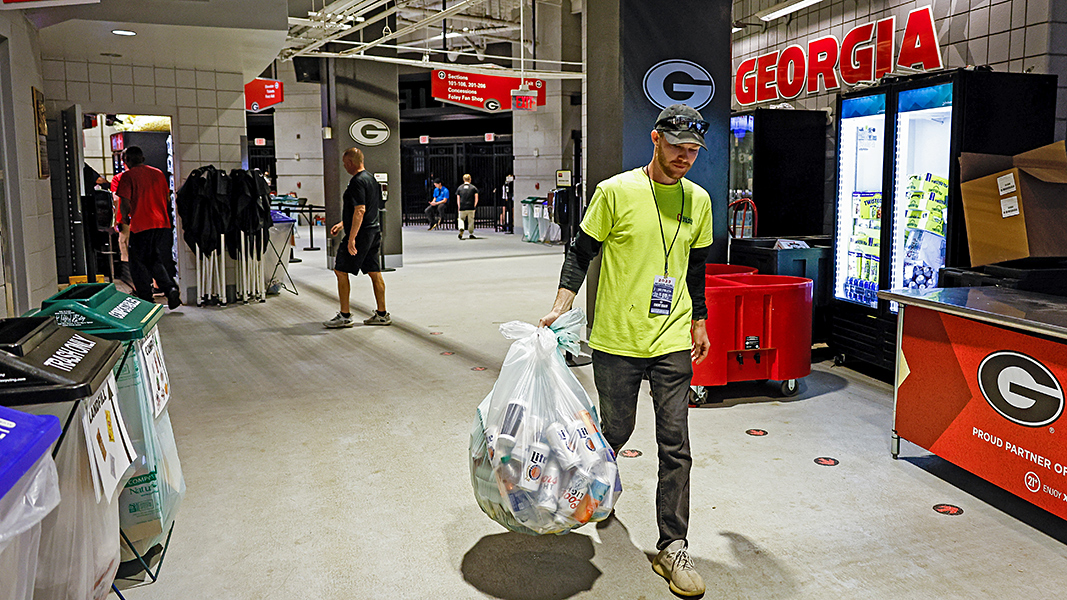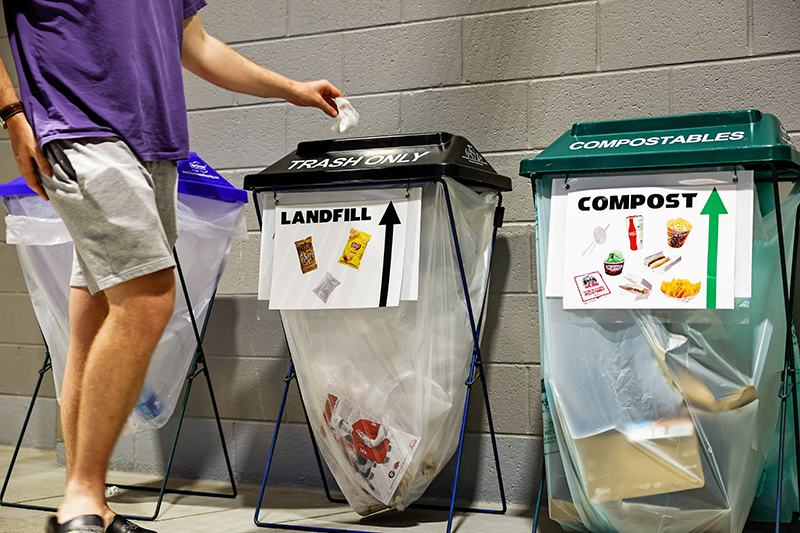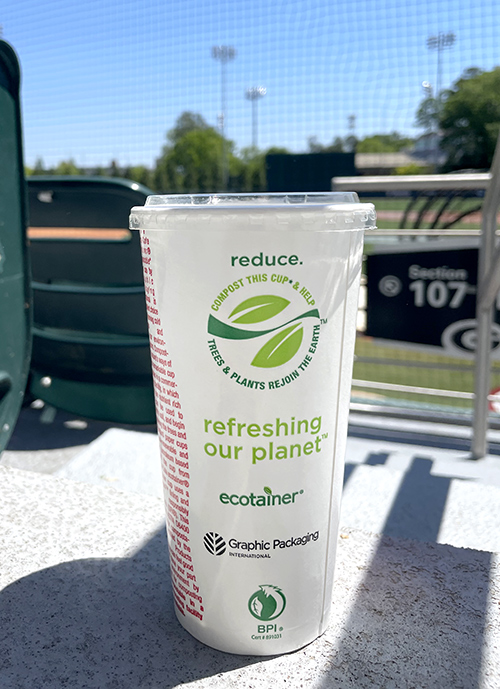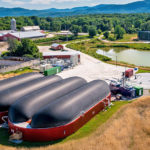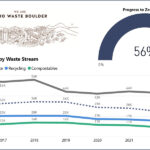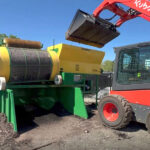Top: All bags from the bins were taken by volunteers to a sorting station behind the stadium to conduct audits on collected materials and remove contamination.
Nora Goldstein
The University of Georgia’s (UGA) Sanford football stadium in Athens has room for 90,000 fans. While the stadium offers front-of-house bins for recycling, the diversion rate for football games is between 2% and 7%, according to an article in the UGA paper. “The recycling bins are next to the trash bins, and when the trash bins start filling up, fans often use the emptier recycling bins for their trash,” explains Hunter Scully, a Masters’ student in UGA’s School of Forestry & Natural Resources and a Zero Waste Athletics Graduate Intern with the university’s Office of Sustainability. “That contaminates the recyclables and limits the ability to send them to the local materials recovery facility.”
UGA’s sports facilities are managed by the University of Georgia Athletics Association (UGAA), a private entity that operates separately from the university. The president of UGA ultimately sets the policy regarding waste management practices at the campus stadiums, but day-to-day operations, including the concession contract with the current foodservice provider, Aramark, is under the purview of UGAA.
As a fan attending home football games at Sanford Stadium, Scully was discouraged by the lack of effort to divert more of the stadium’s waste from disposal. Recognizing the challenge of starting with the largest athletic venue on campus, he set his sights on Foley Field, the baseball stadium that seats over 3,000 people and has only one concession stand on the general concourse and a satellite stand in the outfield bleacher section — versus the 35 to 40 stands in the football stadium. “We pitched the idea to UGAA, which endorsed our proposal to run a pilot to test the concept of zero waste practices at a stadium on campus,” notes Scully. “They were receptive, emphasizing that running pilots at smaller sports venues on campus was critical before considering any changes at Sanford Stadium.”
He and staff at the UGA Office of Sustainability began planning the Journey to Zero Waste (ZW) Weekend. They selected April 20-22, 2023, during UGA’s three-game series against the Arkansas Razorbacks baseball team. That weekend also coincided with Earth Week, providing a good backdrop for fan engagement.
All foodservice items used at the games were BPI-certified compostable or recyclable. The two exceptions were bags of peanuts and cotton candy packaged in conventional plastic. Recycling and composting stations would be set up on the concourses, and in the two concession stands.
Laying The Groundwork
The Athens-Clarke County composting facility in Winterville, Georgia accepts source separated food waste and certified compostable bioplastics and paper products. Scully touched base with the county to ensure its willingness to accept the compostables from the pilot project. “Staff gave us the greenlight to bring the organics stream there,” says Scully. “The fact that we planned to sort all collected organics before sending them for processing was a bonus. We knew we couldn’t risk sending contamination to the composting facility, especially when we want to scale zero waste initiatives at other stadiums on campus.”
Sorting also was necessary to conduct audits of collected materials and take weights to measure diversion. A station for sorting was set up behind Foley Field. Inside the stadium, bin stations were set up in 7 locations in the general concourse, and one bin station each at the press box, dugout club, and press level club. The stations had three bins for sorting compostables, recyclables and trash. Volunteers were placed at all the stations to educate fans about what materials go into which bin and answer any questions. For example, fans are accustomed to the branded Coca-Cola cups used for drinks, as the company is one of the main sponsors of UGA athletics. The compostable versions of the Coca-Cola cups have a green stripe on them.
“We took a conservative approach by putting as many volunteers as possible out in the concourse,” explains Scully. “There were 25 volunteers for each game day, all wearing bright yellow shirts with Journey to ZW Weekend printed on them. On the whole, the pilot was received positively. A lot of volunteers reported that once they instructed people on the sorting procedure, they did it correctly the next time they came to the bins. They also noted that kids were much more willing to learn in the moment. Adults tend to be in a hurry when they come to the concourse as they want to unload the used serviceware, use the restroom and get back to their seats quickly!” He adds that workers at the concession stand were enthusiastic about sorting any food prep waste into the organics bin.
Pilot Results, Next Steps
The Journey to ZW Weekend was “a huge success,” reports Scully, with all three individual games exceeding the pilot’s target of 90+% waste diversion. Diversion from the landfill was about 91.6%, or over 1,300 lbs. Of the 1,300 lbs. diverted, almost 60% was sent to the Athens-Clarke County Composting Facility (775 lbs.). There was less than 5% contamination in the compostable and recycling streams.
“We ‘reached’ over 10,000 fans/students during the series and welcomed 77 volunteers for fan engagement and sorting,” he says. “We are excited to use this momentum and will be recommending that UGA Athletics take this ‘win’ into the fall by expanding efforts to the Jack Turner Complex for a full season of women’s soccer. The Journey to ZW Weekend was a way to demonstrate that, with not a ton of effort and maybe not as much investment in compostable wares as you may think, we can make a huge difference in the diversion rate, for, say, every baseball game.”
The experience at Foley Field validated the fact that pilots are going to be key to getting buy-in from UGAA and other campus officials, including the president of the university. Scully and staff from the Office of Sustainability spoke recently with Judd Michael at Penn State University — a sports stadium greening veteran — about how to break down barriers to buy-in from the athletics department. “Judd said that they found success by starting in the Presidential and the Government Affairs suites at Beaver Stadium, Penn State football’s stadium,” says Scully. “He explained that guests in these suites include elected officials, corporate CEOs and big donors. Starting in these suites at Beaver Stadium was a way to showcase sustainability initiatives on campus and test out zero waste practices.”
Plans are underway for instituting a zero waste program in the fall at the soccer stadium for the UGA women’s team. “Getting three to four pilot project successes will set the stage for wider scale adoption on campus” he adds. “The Sanford football stadium will be challenging, in large part because it is over 100 years old and will need infrastructure improvements to create a location within the complex for sorting collected materials after games. There would also need to be a change in UGAA’s contract with the cleaning service that comes in after games to ensure they separate compostables, recyclables and trash left behind in the stands correctly.”
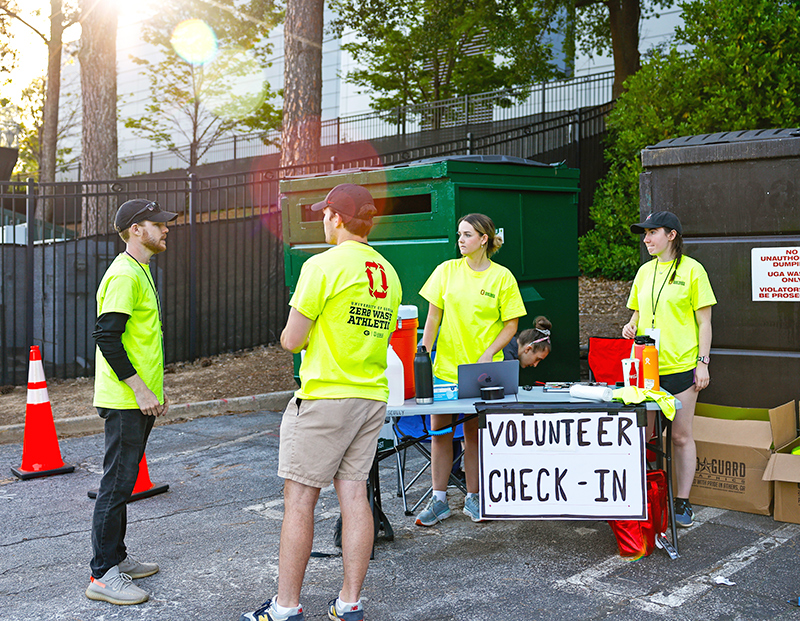
A total of 77 volunteers helped with fan engagement and sorting during the Zero Waste Weekend. Hunter Scully (left) initiated and managed the event.
Fortunately, foodservice contractors like Aramark are experienced in incorporating zero waste practices into their concession services, including procurement of certified compostable products. As part of fan engagement, UGAA welcomes volunteers with local sports teams, e.g., high schools and club teams, to staff the stands for fundraisers. Making sure those volunteers are well-versed in zero waste practices also will be essential.
Finally, getting support from the three primary sponsors of UGAA Athletics — Delta Airlines, Coca-Cola Company and Georgia Power — for the zero waste pilots and full-scale implementation at Sanford Stadium would be a significant boost to changing current waste management practices. “All three companies have robust sustainability initiatives,” says Scully. “Delta has a premium suite area called Delta Hub at Mercedes-Benz Stadium in Atlanta, one of the greenest sports venues in the U.S., so they have experience with zero waste practices. Working with these three sponsors not only presents good opportunities for zero waste, it also could help with getting some of the costs covered to get programs started at UGA sports venues.”


